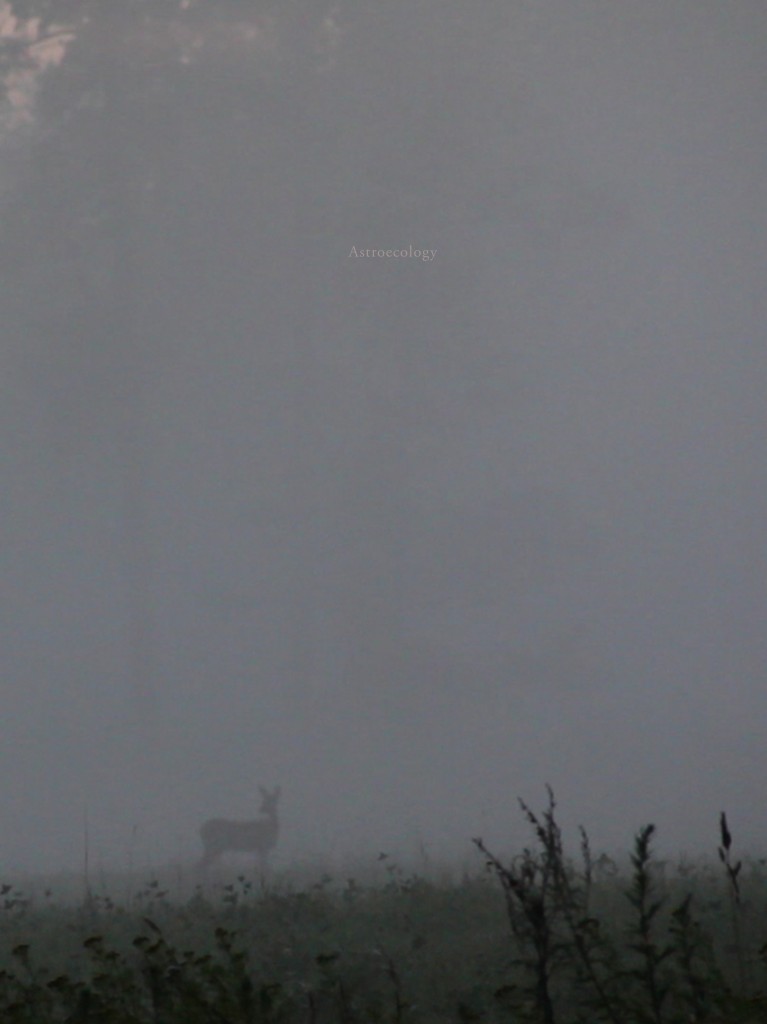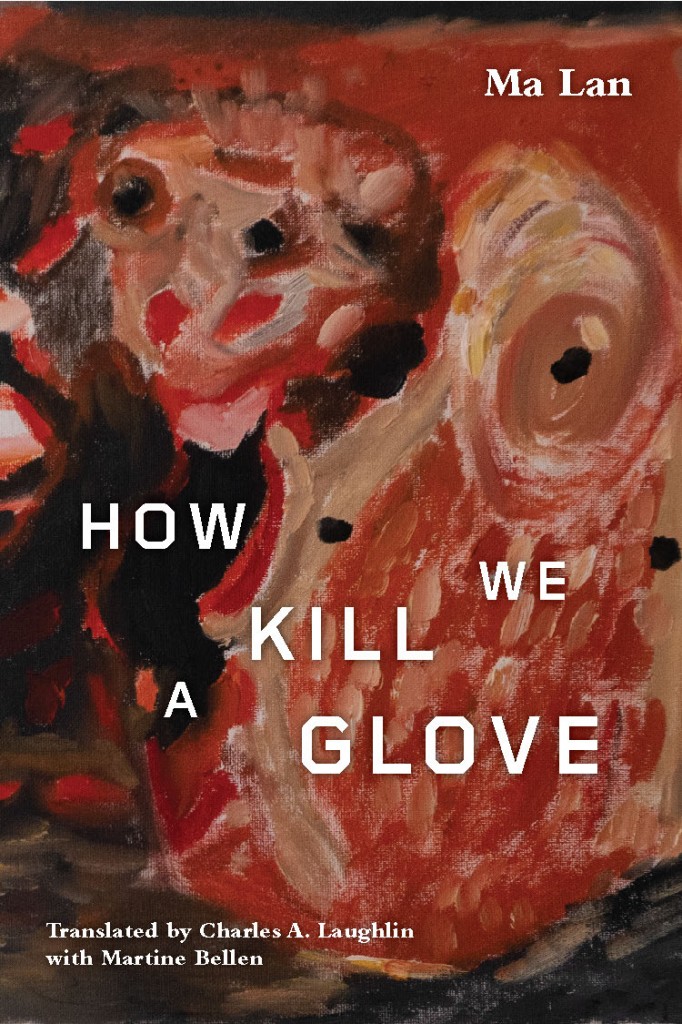
How We Kill a Glove
by MA Lan
Translated by Charles A. laughlin w/ Martine Bellen
RELEASE DATE: April 2023
16 + Shipping
Ma Lan writes poems that carry us suddenly into the vast, strange worlds of myth and dream. Blurring the lines between subject and object, Ma’s poetry reveals the character, the liveliness inherent in objects, which seems hidden but never really was (“I wrap a floral tablecloth around my body/making the napkins line up naked”); her poems operate their own internal logic that aligns and then departs from the logic of shared reality (“Death never rejects a reason for ceasing to breathe”). Charles Laughlin’s sensitive, acute translation of Ma Lan’s poems bring readers into a world where “Poets are flirtatious horses”, moving with all of the might and symbolism of ancient folklore. Ma, a member of the Muslim Hui ethnic nationality in China, builds surreal spaces in these poems, embedding them with mysterious and at times menacing political undertones. “Where does it come from, this ponderous density?” she asks, using language to search the physical and metaphysical. “Like dreaming a dream beyond the universe.”
Ma Lan was born in Meishan, Sichuan, in the People’s Republic of China, a member of the Muslim Hui ethnic nationality. Formerly an accountant at China Construction Bank, she emigrated to the U.S. in 1993. Lan began publishing poetry in 1982, and has published poetry and fiction in Chinese literary journals such as Hua cheng (Flower City), Zhongshan, Renmin wenxue (People’s Literature), Xiaoshuo jie (Fiction World), Jintian (Today), and Poetry Monthly, in addition to selected works in various annual and topical poetry anthologies. Ma Lan has self-published a poetry collection Zuo zai nali (Where to Sit), a short story collection Hua fei hua (The Flowers are not Flowers), and for many years served as editor of Olive Tree online literary magazine, the first online journal of serious contemporary Chinese literature. Recently, fifteen of her poems were included with works of twenty-two other Chinese poets living around the world in the anthology Sihai wei shi (Poems in All Directions) edited by Mi Jiayan and published by Shanxi Media and Publication Group.
Posted by Elizabeth Clark Wessel, February 5th, 2023.
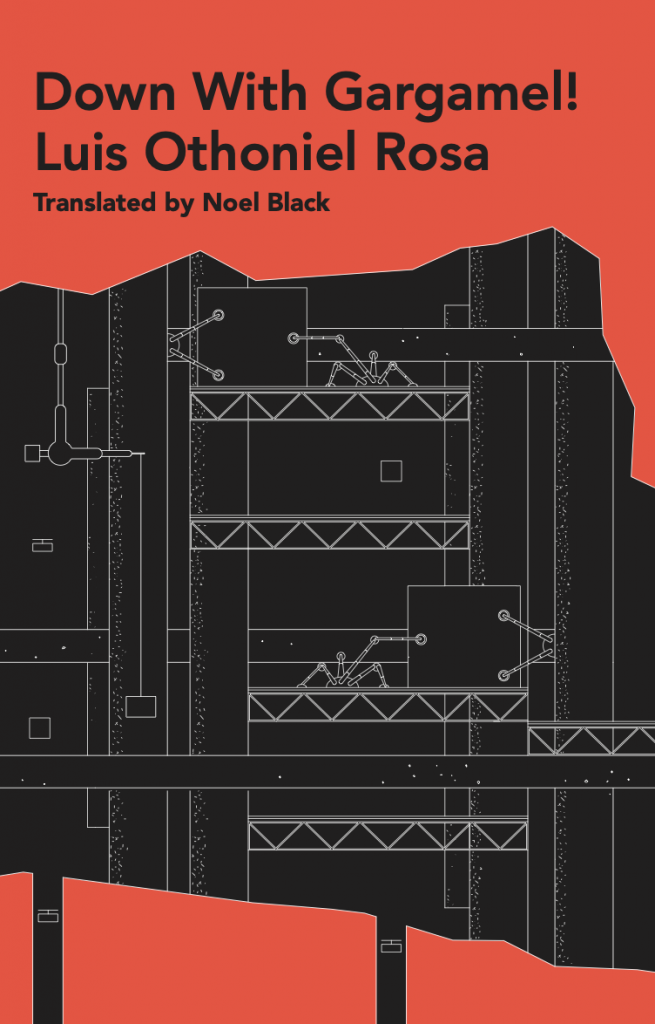 Down With Gargamel!
Down With Gargamel!
by Luis Othoniel Rosa
trans. Noel Black
Release date: Aug 2020
Available for preorder / $16
Down with Gargamel! is a futurist tale set in Puerto Rico, New York, and Colorado Springs that unfolds during the transition from peak oil production to a future that’s formless, dangerous, and full of possibility. As global capitalism collapses under the weight of a worsening environmental crisis, we encounter the stories of six friends as they move through different forms of consciousness and across galaxies. Stories are presented as a narrative fractal in which the same occurrence is retold at different scales. Conversations abound: on black holes during a Puerto Rican blackout; inside the head of a schizophrenic professor; in an apartment in Brooklyn the very morning the world learns aliens have sent us a message; at a “happy death home” where three comrades and a cat care for twelve voluntarily dying bodies; and finally between intergalactic Smurfs and a nostalgic angel. Rosa’s vision is at once absurd and terrifying, specific and idealistic, rooted in the paranoid tradition of J.L. Borges and Phillip K. Dick and inspired by a wide range of radical political movements.
Praise for Down with Gargamel
“In a near future, yuca is exchanged for rum and candle caravans travel from Santurce to Río Piedras. In a far future, in a prophesy of the past, we are drawn to cathedrals that serve as complex ecosystems, underground tunnels connecting narratives, lives that unfold into each other and are suddenly cut short, ending a pattern driven by the proximity of difference. Othoniel has written a novel whose language infectiously spreads like riotous voices filling a once-empty palace.”
—Raquel Salas Rivera, author of lo terciario/ the tertiary and while they sleep (under the bed is another country)
–
 Luis Othoniel Rosa (Puerto Rico, 1985) is the author of the novels Otra vez me alejo (Argentina, 2012) and Caja de fractales (Argentina/Puerto Rico 2017), and of the study Comienzos para una estética anarquista: Borges con Macedonio (Chile, 2016). He studied at the University of Puerto Rico and holds a Ph.D. from Princeton. He teaches Latin American literature at the University of Nebraska. Down with Gargamel! is his first book translated into English.
Luis Othoniel Rosa (Puerto Rico, 1985) is the author of the novels Otra vez me alejo (Argentina, 2012) and Caja de fractales (Argentina/Puerto Rico 2017), and of the study Comienzos para una estética anarquista: Borges con Macedonio (Chile, 2016). He studied at the University of Puerto Rico and holds a Ph.D. from Princeton. He teaches Latin American literature at the University of Nebraska. Down with Gargamel! is his first book translated into English.
Posted by Elizabeth Clark Wessel, April 16th, 2020.
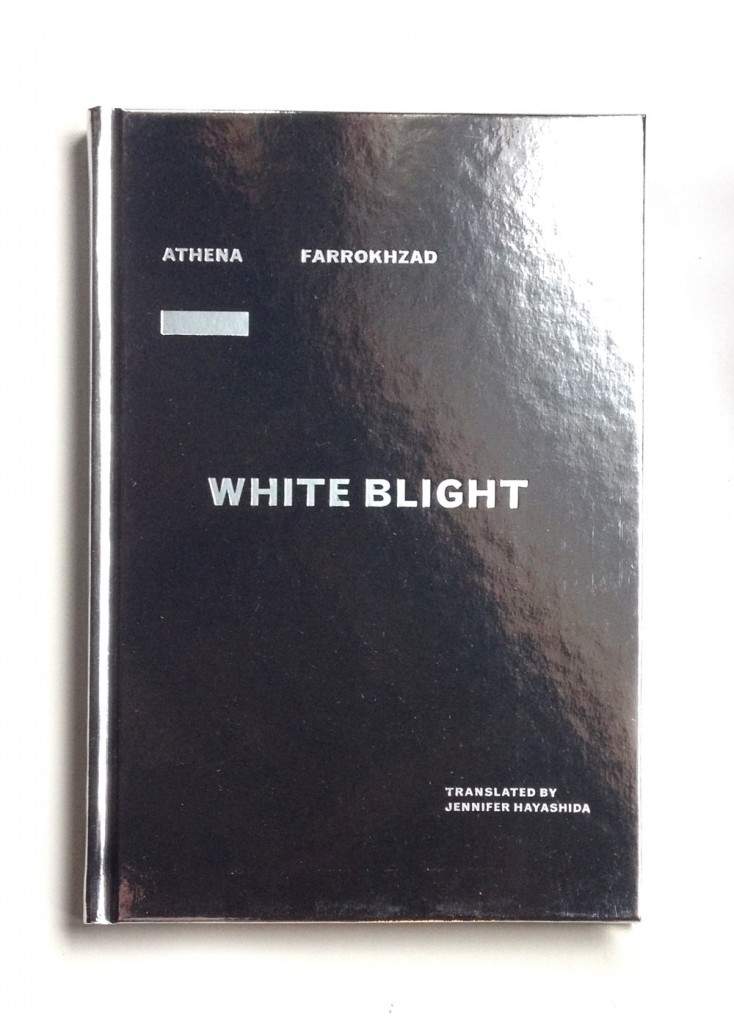
White Blight
by Athena Farrokhzad
translated by Jennifer Hayashida
Full-length, Hardcover
18 + Shipping*
This vital book exposes the dense tectonics churning beneath migrant dreams. Accusatory, loving, full of grief and sage truths, Athena Farrokhzad’s White Blight speaks eloquently to the troubled inheritance of diasporic survival. Through a litany of terse voices, Jennifer Hayashida’s sensitive translation describes the nexus of filial obligations and projections under which the narrator sinks from view. The intense beauty of devastation and the poignancy of betrayal emerge with startling frankness: “Your family will never be resurrected like roses after a fire.” “I have spent a fortune for your piano lessons / But at my funeral you will refuse to play.” These white lines make me ask, what has been bleached out in all of our stories? I read this book, and I remembered my humanity.
— Sueyeun Juliette Lee
It is hard to explain not just the resonance of Athena Farrokhzad’s work but of Farrokhzad herself. She is a major figure in Sweden, an outspoken feminist and leftist. She is also a stunning writer. On its surface White Blight is a story of migration, how it shapes and misshapes the familiar. Everyone in this poem has something to say about immigration’s trauma, on the impact globalization has on all sorts of intimacy, even as they are so rarely talking to each other. It is also a poem that moves through many registers. At moments it is mannered and metaphoric. At other moments frank and colloquial, intimate too. And Jennifer Hayashida has skillfully translated this complicated work into an ease of English.
— Juliana Spahr
In White Blight, Athena Farrokhzad evokes a language of feeling that is vivid and deeply familiar. The poem performs as intimately as memory, but with the direct language of confession or accusation. In this world, the family unit nurtures by prolonging disquietude, as there is no forgetting the ruptures of exile and immigration. Still these voices yearn to be proven wrong in a future they cannot predict. The pith and force of the language shines through in Jennifer Hayashida’s careful translation, both polished and knife-sharp.
— Wendy S. Walters
Read the rest of this entry »
Posted by Elizabeth Clark Wessel, September 23rd, 2016.
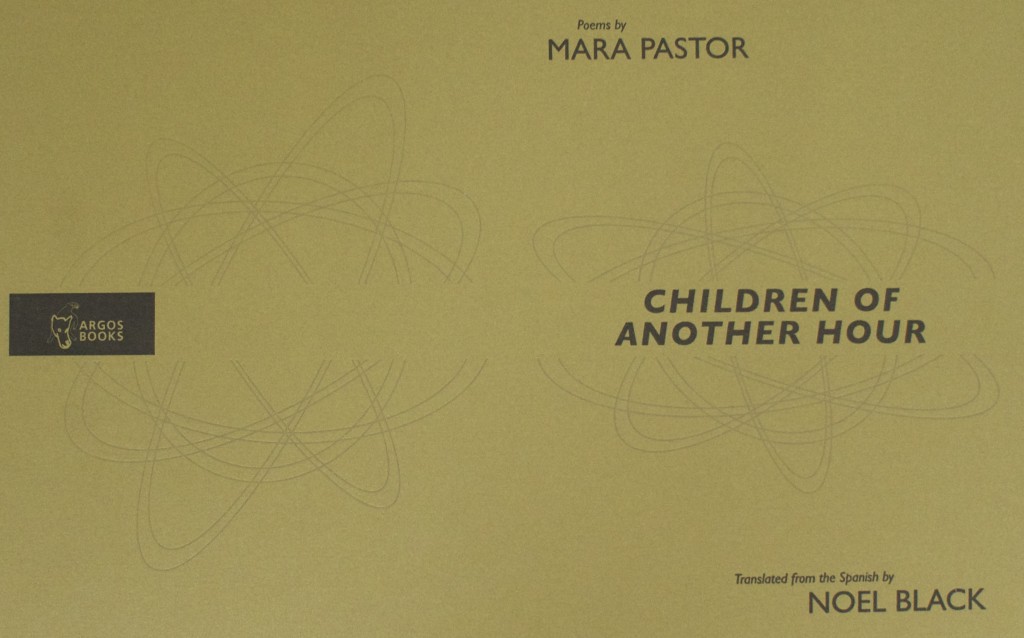
Children of Another Hour
by Mara Pastor
Translated by Noel Black
Letterpressed, Hand-bound chapbook / $10
“Come, astronomer,/ and tell me your abysses./ That static that smashes/ into our heads every time we mend// a beginning.”
In this collection of twenty intensely imagined poems, Mara Pastor has built a whole universe of post-futuristic melancholy. These poems, despite their brevity, take on the human condition – love and death – in a world of cosmonauts, scientists, space travel, and post-apocalyptic gloom. They are concerned with the fleeting nature of our time here on earth (and in space), our inability to connect with each other, and also with our fate as a species. The poet Noel Black has rendered this work in an American English so natural and fine that it almost feels inevitable. This is the kind of book you keep in your pocket and your head for a very long time.
–
Mara Pastor (San Juan, 1980) is a poet, editor and translator. Her works include the books of poetry: Poemas para fomentar el turismo (La secta de los perros, 2012); Candada por error (Atarraya Cartonera, 2009) and Alabalacera, (Terranova, 2006). Mara’s creative and critical writings have appeared in several magazines and she is featured in such anthologies as Hallucinated Horse: New Latin American Poetry (Pighog Press, 2012) and Red de voces: poesía puertorriqueña (Casa de las Américas, 2012). At this time, she lives in Mexico City.
Noel Black lives in Colorado Springs with his wife, artist Marina Eckler, and their two sons. Co-founder with Ed Berrigan of LOG Magazine and publisher of Angry Dog Midget Editions in the late 1990s, he has since worked as a writer and producer for a wide variety of media outlets including The Stranger and WNYC. He currently works as a producer for KRCC public radio. He is the author of half-a-dozen chapbooks including Hulktrans (Owl Press) and In The City of Word People (Blue Press, 2008).
Posted by Elizabeth Clark Wessel, March 17th, 2014.
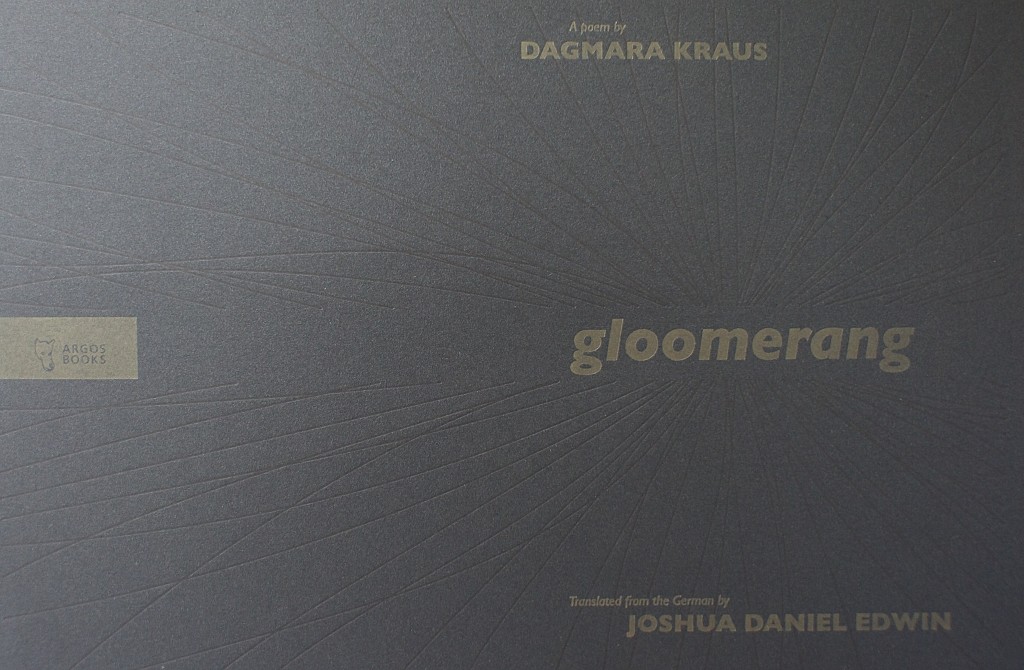
gloomerang
BY dagmara kraus
translated by joshua daniel edwin
HAND-BOUND CHAPBOOK / $10
Exuberant, darkly funny, and very smart, this long poem by German poet Dagmara Kraus makes music from a state of mind. Its voracious attitude to form and diction is both timeless and completely of this moment. Joshua Daniel Edwin has vividly brought Kraus’s neologisms, music, and rhythms into English with wit and authority. An extremely strong debut from two young poets.
—-

Dagmara Kraus was born in Poland and raised there and in Germany. Her poetry and translations appear widely, including the poetry collections kummerang (KOOKBOOKS, Berlin, 2012) and kleine grammaturgie (Urs Engeler/roughbooks, Solothurn, 2013). She currently lives in rural France and is translating the diary of Polish poet Miron Białoszewski.
space
 Joshua Daniel Edwin’s poetry appears in a variety of publications in print and online. His translations of Dagmara Kraus’ poetry were awarded a 2012 PEN/Heim Translation Fund Grant and a 2012 ALTA Fellowship. He lives in Brooklyn and is a member of the editorial board for the magazine Circumference: Poetry in Translation.
Joshua Daniel Edwin’s poetry appears in a variety of publications in print and online. His translations of Dagmara Kraus’ poetry were awarded a 2012 PEN/Heim Translation Fund Grant and a 2012 ALTA Fellowship. He lives in Brooklyn and is a member of the editorial board for the magazine Circumference: Poetry in Translation.
Posted by Elizabeth Clark Wessel, February 24th, 2014.
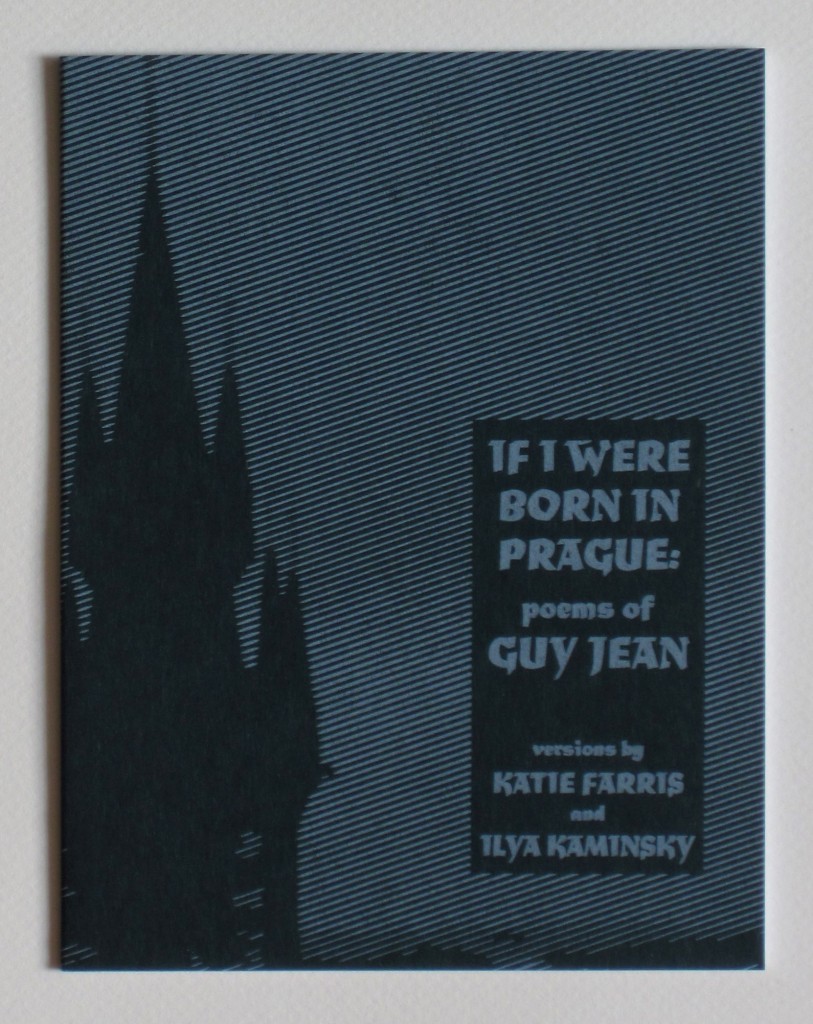
If I Were Born In Prague
By Guy Jean
Versions by Katie Farris & Ilya Kaminsky
Perfect-bound chapbook/bilingual edition (French & English) / $10space
Guy Jean is a member of the first generation of French-Canadian poets to re-discover the cultural heritage of Acadia, which Jean describes as, “a folklore truculent with daily life, local lore linked to universal legends and songs handed down from generation to generation rich in 17th century tavern songs and music going back to the troubadours.” This culture was devastated by the violent British takeover of the region. In Jean’s work the influence of this culture and history combined with the more familiar French poetics of Rimbaud and Michaux results in a work of haunting lyricism. The poems are both playful and mythic, while still seriously engaging in questions of inherited violence.
In If I were born in Prague Jean’s work is beautifully re-imagined in versions by Katie Farris and Ilya Kaminsky allowing English readers an entry point into the vital work being done by one of our neighbors.
space Read the rest of this entry »
Read the rest of this entry »
Posted by Elizabeth Clark Wessel, July 6th, 2011.
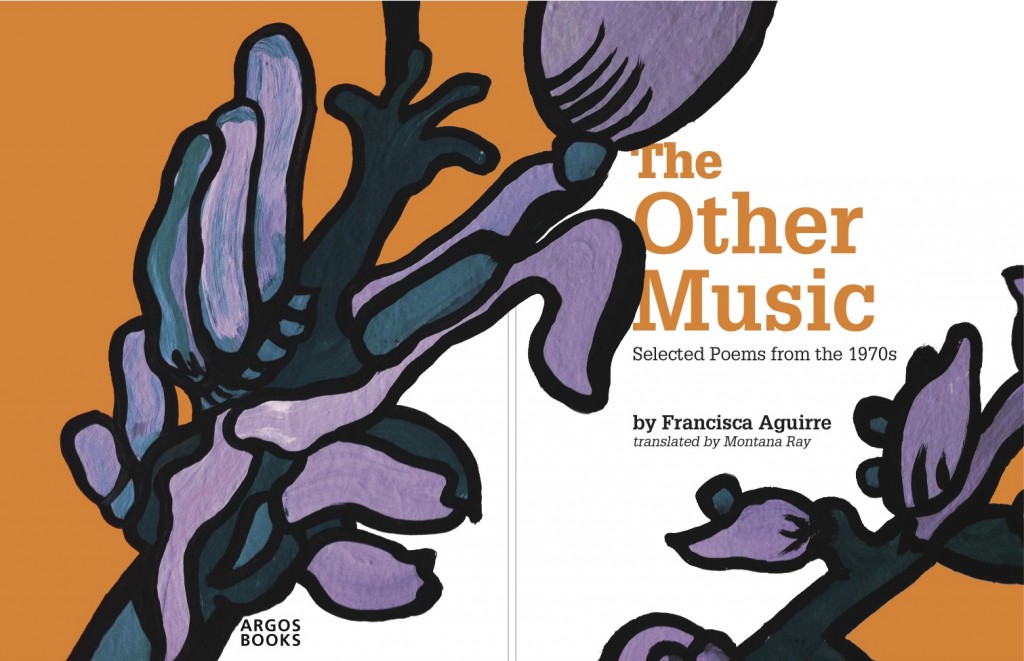
The Other Music: Selected Poems from the 1970s
by Francisca Aguirre
tr. by Montana Ray
PERFECT-BOUND CHAPBOOK / Bilingual edition (Spanish & English)/ $10
Read the rest of this entry »
Posted by Elizabeth Clark Wessel, May 30th, 2011.




